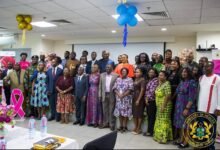Pupils collect plastic waste for recycling in Jasikan
Pupils from seven primary and junior high schools in the Jasikan Municipality of the Oti Region are engaged in a programme that involves gathering plastic bottles and rubber sachets for recycling.
The schools taking part include Jasikan Primary, Roman Catholic Primary, Nurria Islamic, Jasikan College of Education Demonstration, Seventh Day Adventist (SDA) junior high school (JHS), Presbyterian JHS, and Anglican JHS.
The initiative, led by the Share Foundation, a charitable organisation, is designed to cultivate a sense of environmental cleanliness among the students to enhance public health.
At the end of each year, all participating schools are rewarded with dustbins and hand washing containers, while the pupils receive bags to encourage continued collection of plastic waste.
During a ceremony in Jasikan, Ms Lilly Mintah, the Director of Share Foundation, presented Zoomlion-branded school bags, hand washing rubber containers, and bins to Jasikan College of Education Demonstration School.
Ms Mintah announced that the foundation’s management had made the decision to expand its operations to the Oti Region in 2023 with the aim of instilling the practice of maintaining a clean environment among school children.
She said the foundation first introduced recycling initiatives in schools in Tema seven years ago, alongside providing scholarships to academically gifted yet underprivileged students.
She said the foundation had collaborated with 50 schools in Tema within the Greater Accra Region, Sandema in the Sandema District of the Upper East Region, and the Jasikan Municipality.
Ms Mintah emphasised that promoting environmental cleanliness was crucial in mitigating flooding in various communities, as plastic waste often obstructs drainage systems and impedes the natural flow of rainwater.
She encouraged schools to incorporate the collection of plastic bottles and sachet wrappers into the activities of school clubs, emphasising the importance of Ghanaian children taking the lead in preserving the cleanliness of their surroundings regardless of their location.
FROM SAMUEL AGBEWODE, JASIKAN







